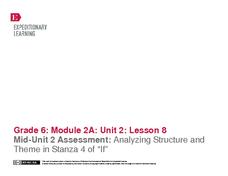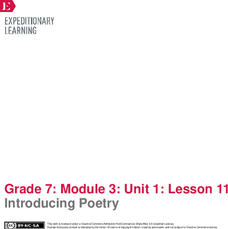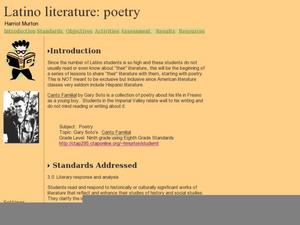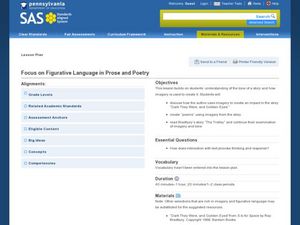Georgia Department of Education
Exploring Poetry and Poets
Combine the study of poetry and non-fiction texts with this complete and ready-to-use six-week unit. After reading numerous poems from local writers and compiling a personal anthology, high schoolers find and read a memoir or biography...
Curated OER
Poetry Passport
Passport photos are notoriously unflattering but here's an activity that encourages youngsters to create a poetic picture of themselves using each category on the passport as a prompt for a poem.
EngageNY
Gathering Evidence and Drafting a Two-Voice Poem (Chapter 13: "Los Duraznos/Peaches")
Begin class with a short comprehension quiz and review and then move into a new genre: two-voice poems. The activity provides information about this type of poetry as well as a video example made by eighth graders that you can show your...
Poetry4kids
Simile and Metaphor Lesson Plan
Similes and metaphors are the focus of a poetry lesson complete with two exercises. Scholars read poetry excerpts, underline comparative phrases, then identify whether it contains a simile or metaphor. They then write five similes and...
Curated OER
Bringing Household Items to Life
Use folk tales as inspiration for learning about and using personification in creative writing. Learners brainstorm together in order to practice personification before writing their own poems or paragraphs about a household object.
Poetry4kids
Alliteration and Assonance Lesson Plan
Scholars analyze the poem My Puppy Punched Me in the Eye by Ken Nesbitt in order to locate examples of alliteration and assonance. After reading the poem, alliterative words are underlined and assonant words are circled.
EngageNY
Analyzing Structure and Theme in Stanza 4 of “If”
Here is a lesson that provides scholars with two opportunities to stretch their compare-and-contrast muscles. First, learners compare and contrast their experience reading the fourth stanza of If by Rudyard Kipling to listening to the...
EngageNY
Introducing Poetry
A silent reading session permits class members to meet individually with their teacher to discuss their text. Learners then discuss and express their observations about two poetry quotes, recording thoughts about craftsmanship, forms of...
Literacy Design Collaborative
Catching a Grenade: How Word Choice Impacts Meaning and Tone
Beyonce's "Halo" and Bruno Mars' "Grenade" provide eighth graders with an opportunity to consider how a writer's choice of words can create a very different tone even when the subject is the same. After a close reading of both lyrics,...
Curated OER
Sense Poetry
Access your young poets' senses and emotions with this activity, which guides them through the process of writing a "sense poem." After working on a sense poem as a class and modeling the procedure, individuals work on their own poems...
Curated OER
Latino Literature: Poetry
Under construction, this lesson focuses on Canto Familia, a collection of poetry about Gary Soto's experiences growing up in California's Imperial Valley. Representative of the experiences of many Latinos, the poems also address themes...
Curated OER
Use of Personification and Imagery in Poetry
A reading of Theodore Roethke’s dark "Root Cellar" and Sylvia Plath’s more abstract "Mirror" launches a discussion of imagery and personification in poetry. After finding examples of personification in the poems, class members craft...
Curated OER
Using Similes and Metaphors in Poetry
The use of similes and metaphors will become more clear and your students will gain knowledge and comprehend the meanings of the words with these activities. They compose interesting similes and metaphors based on visual prompts and...
Curated OER
Sound poems
Third graders write a class poem based on the use of sound to create effects. They investigate use of onomatopoeia and how to write in a tight structure.
Curated OER
Biographical Poems
Students write a biographical poem about themselves. They observe a teacher-led demonstration, write an autobiographical poem and a biographical poem about a famous person using a template form, and display the poems side-by-side.
EngageNY
Looking Closely at Stanza 3—Identifying Rules to Live By Communicated in “If”
Just as Bud, from the novel Bud, Not Buddy by Christopher Paul Curtis, had rules to live by, so does the poem, If by Rudyard Kipling, but how do the two relate? Pupils delve deep into the poem's third stanza, participate in a grand...
Curated OER
Preparing for Poetry: A Reader's First Steps
Students complete poetry analysis using William Shakespeare's "Sonnet 130" as a part of a study of figurative language. In this Shakespearean language lesson plan, students define literal and figurative language and practice paraphrasing...
Curated OER
Analyzing Literary Devices
Eighth graders identify figurative language and poetry in this literary analysis lesson. Using Through the Looking Glass by Lewis Carroll and a YouTube video for "The Walrus and the Carpenter," young readers complete a literary device...
Curated OER
Revision
Young poets learn the value of using a thesaurus when crafting and revising poems. They examine poems rich in figurative language and then a revised version with the figurative language removed. To demonstrate what they have learned,...
Curated OER
Lesson Plan: Letting Go
Why would an artist destroy his own work? Kids examine the Malagan practice of creating and then destroying art. They talk about the cultural and spiritual significance of this practice, as well as how it relates to consumerism in...
Curated OER
Figurative Language Scavenger Hunt
Eighth graders analyze and interpret figurative language. They listen to some examples of poetry which use figurative language. Then, they divide into groups and attempt to find more examples. Finally, 8th graders write what the poet is...
Curated OER
Focus on Figurative Language in Prose and Poetry
Students place emphasis on the use of figurative language when analyzing prose and poetry. In this figurative language lesson, students explore the tone of a story and its imagery. Students read and discuss how the author uses imagery in...
Curated OER
Out of the Dust: Figurative Language
Students find examples of figurative language in "First Rain" in Out of the Dust. In this Out of the Dust lesson, students takes notes on various type of figurative language and identify examples of each type in the poem.
Curated OER
Figurative Language and Symbolism
Students identify figurative language and symbolism in poetry as well as prose. In this literary elements lesson, students read and discuss the role of symbolism in Yellow Man by Moonlight, A Christmas Carl, The House of Wings, and...

























